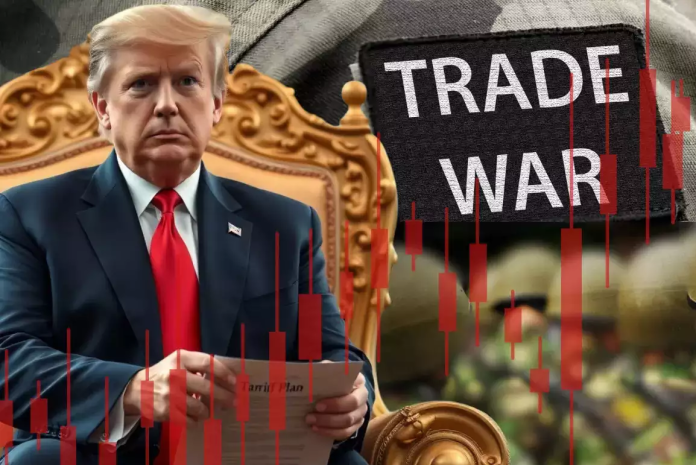The global trade landscape is increasingly fraught as US President Donald Trump’s tariff policies spark retaliatory measures from the European Union, Mexico, Canada, and China, while a diplomatic dispute over China’s influence around the Panama Canal adds another layer of tension.
Trump reiterated his intent to impose tariffs on the EU, stating, “It will definitely happen with the European Union, I can tell you that.” He criticised the US trade deficit with the bloc and demanded greater imports of US cars and agricultural products.
However, he struck a softer tone on the UK, citing a good relationship with Prime Minister Keir Starmer, he warned that tariffs “might happen” unless trade imbalances are addressed.
Well Prime Minister Starmer’s been very nice, we’ve had a couple of meetings, we’ve had numerous phone calls, we’re getting along very well, we’ll see whether or not we can balance out our budget.
Meanwhile, Mexico and Canada responded to Trump’s tariffs with their own levies. Mexican President Claudia Sheinbaum emphasised that “problems are not addressed by imposing tariffs, but with talks and dialogue,” whereas Canadian Prime Minister Justin Trudeau vowed to “stand up for Canada.” The department of finance released a list of US products imported into Canada, facing retaliatory tariffs of 25% starting from Tuesday.
China, too, condemned Trump’s tariffs as a violation of World Trade Organisation (WTO) rules. A Chinese commerce ministry spokesperson added that Beijing would take countermeasures to “safeguard its own rights and interests.”
Trump acknowledged that his tariffs might cause “short-term pain” for Americans, but defended them as necessary to address long-standing trade imbalances. However, the economic impact is already being felt, with global markets slumping and consumers expressing frustration.
Panama Canal dispute with China
Meanwhile, tensions flared over China’s presence near the Panama Canal. US Secretary of State Marco Rubio warned Panama’s President José Raúl Mulino that Washington would “take measures necessary” if Panama failed to curb Beijing’s influence.
Rubio claimed that a Hong Kong-based company operating ports near the canal violated the US-Panama treaty, though Panama insisted the canal remained under its sovereign control.
Mulino signalled a willingness to review agreements with China, including a 2017 memorandum of understanding under the Belt and Road Initiative, but stressed that Panama’s sovereignty was non-negotiable.
We’ll study the possibility of terminating it early. I do not feel that there is any real threat at this time against the (neutrality) treaty, its validity, and much less the use of military force to make the treaty.
Trump, however, did not rule out forceful measures, stating, “China is running the Panama Canal that was not given to China, that was given to Panama foolishly, but they violated the agreement, and we’re going to take it back, or something very powerful is going to happen.”
However, Chinese Foreign Ministry spokesperson Mao Ning emphasised that China had no role in the operation of the canal and that it respected Panama’s sovereignty and independence over the waterway.
The escalating trade wars and Panama Canal dispute underscore the fragility of global economic relations under Trump’s “America First” policies. While his administration seeks to protect US interests, the retaliatory measures from key trading partners and the potential for military intervention in Panama risk destabilising international markets and alliances.
